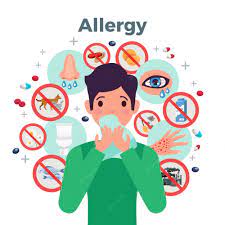pollen allergies are common, and can cause respiratory problems, skin rashes, and even anaphylaxis (a life-threatening allergic reaction). But what about heart palpitations?

There’s a lot of speculation out there about whether pollen allergies can cause heart palpitations. Some say that people who suffer from pollen allergies are more likely to experience heart palpitations, while others insist that this is not the case. So which is it?
The answer to this question may come down to a genetic susceptibility. If you have a family history of heart problems, then you’re likely to suffer from heart palpitations even if you don’t have pollen allergies. But if you don’t have any family history of heart problems, then it’s likely that pollen allergies won’t cause your heart to race.
What are the causes of pollen allergies?
Pollen allergies are caused by the allergen proteins in pollen. The proteins are found in the stamen (the male organ of a flower) and the pistil (the female organ).
There are many things that can cause an allergic response, but pollen is one of the most common allergens. Pollen can cause a mix of symptoms, including rhinitis (runny nose), asthma, eczema, and food allergies.
Some people are more likely to develop an allergy to pollen than others. Factors that can increase your chance of developing a pollen allergy include:
-Having hay fever, which is an inherited condition
– Exposure to grass, trees, or flowers as a child
– Having a parent or sibling with a pollen allergy
– Having a genetic risk for developing allergies
– Being African American or Native American
– Having had chickenpox as a child
– Living in an area with high pollen levels
How do pollen allergies affect the heart?
Pollen allergies can cause symptoms such as heart palpitations, shortness of breath, and chest tightness. These symptoms may be worse in people who are already prone to heart problems. In some cases, pollen allergies can even lead to a heart attack. If you experience any of these symptoms after exposure to pollen, it’s important to consult with a doctor.
Symptoms of pollen allergies and their effects on the heart
Pollen allergies can cause symptoms that can affect the heart, including palpitations, shortness of breath, and an increase in heart rate. The symptoms of pollen allergies can be worsened by exercise or stress, and can lead to an increased risk of heart disease. If you are experiencing any of these symptoms and think you may have a pollen allergy, it is important to speak to a doctor about your situation.
What can be done to relieve symptoms of a pollen allergy and improve heart health?
There is no one-size-fits-all answer to this question, as the best approach for relieving symptoms and improving heart health will vary depending on the individual’s allergy profile and medical history. However, some common steps that may help include avoiding exposure to pollen in the first place, using antihistamines when symptoms peak, and receiving treatment for any underlying conditions.
What are pollen allergies?
Pollen allergies are a type of allergy that occurs when the body reacts to pollen. Pollen is a type of plant life that is spread by the wind. Allergies to pollen can cause symptoms like itchy eyes, sneezing, and a runny nose. In some cases, people with pollen allergies may also experience heart palpitations.
How does pollen allergy affect the heart?
Pollen allergies can cause an individual to experience heart palpitations, also known as arrhythmias. These irregular heartbeat episodes can be mild or severe, and they often occur when an individual is exposed to pollen. Pollen grains irritate the lining of the lungs, which can lead to a generalized allergic reaction in people with pollen allergies. This reaction can cause a variety of symptoms, including a racing heart. In some cases, pollen allergy can even lead to a life-threatening anaphylactic shock.
Can pollen allergies cause heart palpitations?
Pollen allergies can cause heart palpitations, according to a study published in the journal Allergy. The study found that people with pollen allergies are more likely to experience shortness of breath, chest tightness, and rapid heart rate when they are exposed to pollen. These symptoms can be particularly severe in people who have asthma or other respiratory conditions.
What are pollen allergies?
Pollen allergies are a type of allergy caused by the proteins found in pollen. These proteins can cause an allergic reaction in people who are sensitive to them. When a person has an allergic reaction to pollen, their body sends out an inflammatory response. This response can cause heart palpitations, difficulty breathing, and swelling of the lips and tongue.
Pollen allergies can also lead to other respiratory problems, such as asthma. If you think that you may have a pollen allergy, it is important to speak with your doctor about it. They can test your blood for signs of an allergic reaction and recommend treatments if necessary.
What causes pollen allergies?
Pollen allergies can cause heart palpitations, which is a symptom of an allergic response. Symptoms of an allergic response can include a rash, itching, asthma, and coughing. Pollen allergy symptoms can vary depending on the person, and can also be triggered by different types of pollen.
What are the symptoms of pollen allergies?
Pollen allergies can cause a variety of symptoms, including skin rashes, sneezing, itchy eyes, and heart palpitations. While many people experience only minor symptoms from pollen allergies, those with more severe allergies may experience more serious symptoms. Common symptoms of pollen allergies include shortness of breath, wheezing, chest tightness, and lightheadedness. Those with the most severe form of the allergy may also experience anaphylaxis, a life-threatening allergic reaction that can lead to shock and death.
How can pollen allergies be treated?
Pollen allergies can cause chest tightness, shortness of breath, and even heart palpitations. If you’re experiencing any of these symptoms, it’s important to see a doctor as soon as possible to find out what’s causing them and to get treatment. Often, simply adjusting your lifestyle or medication dosage can make all the difference in managing pollen allergies.
What are pollen allergies?
Pollen allergies are a type of hypersensitivity to pollen. They are caused by the immune system reacting to pollen as if it were a foreign invader. The result is an allergic reaction, which can cause shortness of breath, wheezing, and chest tightness.
Pollen allergies can also lead to more serious problems, including anaphylaxis, a life-threatening allergic response that causes swelling of the throat and difficulty breathing. There is no cure for pollen allergies, but treatments include avoiding pollens, using antihistamines, and taking oral corticosteroids.
If you are experiencing any of the symptoms described above, consult your doctor.
What causes pollen allergies?
pollen allergies can cause heart palpitations, itchy eyes and sneezing, runny nose, and red, itchy skin. These symptoms are caused by the release of histamine when the body’s immune system reacts to the pollen.
How are pollen allergies diagnosed?
Pollen allergies are diagnosed by a doctor through an allergy test. The test will determine if the person has a pollen allergy and will also tell the doctor how severe the allergy is. If the person has a pollen allergy, the doctor will recommend treatment. Treatment can include avoiding pollens, using anti-allergy medication, or having surgery to remove the allergen.
How do you treat pollen allergies?
I’ve been asked this question a lot lately, and the answer is complicated because there isn’t one definitive answer. In general, though, you can treat pollen allergies by avoiding things that trigger your symptoms.
There are a few things you can do to reduce your chances of getting pollen-sensitized, including using a dust mask when outside in pollen season, staying indoors as much as possible during pollen season, and using allergen-free products. If you experience symptoms such as shortness of breath, chest pain, or flushing after exposure to pollen, seek medical attention.
If you have severe allergies and cannot avoid exposure to pollen, medications such as antihistamines or nasal corticosteroids may help reduce your symptoms. And finally, if the symptoms are severe and disabling, seeking allergy testing may be necessary to determine the specific allergen that is triggering your allergic response.
What are the side effects of treating pollen allergies?
Pollen allergies are a common problem, and can cause numerous side effects. These side effects can vary depending on the person, but may include: trouble breathing, chest pain, dizziness, and more. If you experience any of these side effects after being treated for pollen allergies, please consult your doctor.
How long will it take for symptoms to disappear after treatment?
There is no one-size-fits-all answer to this question, as the time it takes for symptoms to disappear will vary depending on the individual’s allergy history and immune system. However, many people experience relief from their pollen allergies within a few hours after treatment begins. If you are experiencing shortness of breath, chest tightness, or other symptoms that are not improving after taking steps to treat your allergy, please see a doctor.










